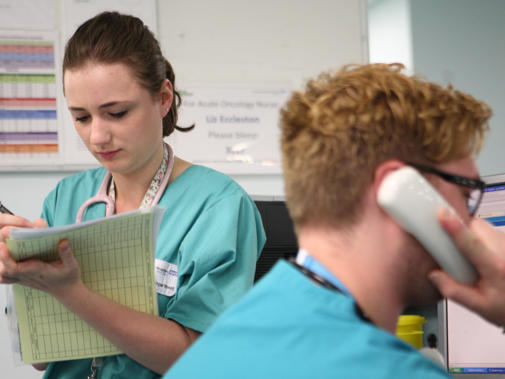The BMA has demanded answers from a hospital trust after it suggested it would put requests for rota-monitoring information from doctors ‘on hold’.
The court of appeal ruled in a test case in August brought by BMA junior doctors committee chair Sarah Hallett (pictured below) on behalf of 20 other doctors, supported by the BMA, which found Derby Hospitals NHS Foundation Trust had failed to carry out rota checks correctly and had underestimated the long hours and inadequate rest of many junior doctors.
 Sarah Hallett, BMA junior doctors committee chair
Sarah Hallett, BMA junior doctors committee chair
The court found the trust had breached Dr Hallett’s contract and ‘acted irrationally’ by inputting ‘expected’ rather than ‘actual’ data into software to assess whether her duty periods were contract compliant – leaving the trainees banded incorrectly and underpaid.
As a result, trainees who have suffered financial loss as a result of incorrect rota checks in the past six years may be able to make claims for pay owed – with rota-monitoring information required to form parts of their cases.
However, a paper submitted to the Derby Hospitals NHS Foundation Trust’s September board meeting said it would put on hold Freedom of Information requests from doctors working at the trust until ‘all legal avenues have been exhausted’.
Legal pressure
In response, solicitors for the BMA wrote to the trust to inform it of ‘statutory obligations’ around the Freedom of Information Act 2000 and Data Protection Act 2018, suggesting a failure to respond within the time limits set out in the legislation would be a ‘flagrant and unlawful breach of our members' statutory right to access information'.
In response to a request for clarification from The Doctor, the trust said it was ‘processing the requests for information and has been corresponding with the individual doctors directly'.
The trust went on to confirm it had decided to request permission to appeal to the supreme court and was preparing to make the application.
The trust’s executive medical director, Magnus Harrison, said: ‘We are proud of our record as a university hospital and we value all of our doctors in training, who provide such a vital service to our patients. Patient safety is central to everything we do in our hospitals and we work hard to ensure excellent training, alongside a good work life balance, for our junior doctors.
‘However, this decision clearly has implications not only for the trust but other NHS employers. In light of the decision of the court of appeal, we are working closely with our legal representatives and relevant stakeholders regarding lodging a further request for permission to the supreme court.’
Patient safety
In August, the then JDC chair Jeeves Wijesuriya described the ruling as a ‘victory’ for junior doctors.
He said: ‘Our objective has always been to establish the correct interpretation in the law to protect patient safety and the interests of junior doctors.
 Jeeves Wijesuriya, Junior Doctor Committee chair
Jeeves Wijesuriya, Junior Doctor Committee chair
‘For those junior doctors on the 2002 contract, banding plays a vital role in ensuring trusts or health boards do not run overly fatiguing or unsafe rotas.
‘Yet the widespread use and incorrect application of monitoring software resulted in trusts failing to pick up issues with working conditions, and potentially weakening the protections afforded to junior doctors in their contracts.
He added: ‘These protections were put in place because it is recognised that junior doctors working long hours in a system under pressure with no provision for even a short break will be left exhausted.’

